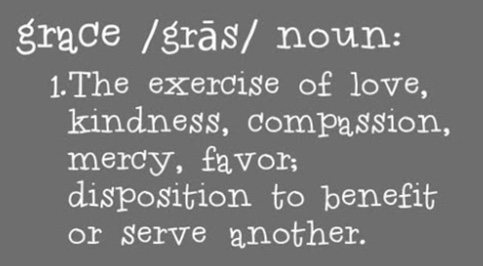
What is Grace?
There’s a hymn in our church hymn book called Did You Think to Pray? The second verse says “When your heart was full of anger, did you think to pray? Did you plead for grace, my brother, that you might forgive another who had crossed your way?” Today I want to try to touch on the aspect of grace hinted at in this verse–giving grace to others.
Grace is a huge topic. Let’s start by talking about what grace is. In Hebrew, it means favor or goodwill. In Geek it is a gift freely given. The gospel topics app says that grace is the divine help or strength extended to us through the atonement of Jesus Christ. It goes on to say that the grace of God helps us every day. It strengthens us to do good works we could not do on our own. The Bible dictionary says that grace is the assistance to do good works that we otherwise would not be able to maintain if left to our own means. One of the dictionary definitions of grace is courteous goodwill. Showing grace to others is about showing kindness to others even when it’s not deserved.

Grace is based on love. We can think of giving grace as living the original golden rule–doing unto others as you would have them do to you; treating others as you want to be treated. Let’s take the golden rule a step further. During the Last Supper Jesus taught a higher law. In John 13:34 he teaches, “A new commandment I give unto you, that ye love one another; as I have loved you, that ye also love one another.” Instead of loving others as you want to be loved, love others as Jesus loves. This sounds simple. Jesus was kind; we can be kind. He treated others fairly; we can treat others fairly. He loved others simply; we can love others simply. But as Gavin Adams, a christian leadership coach, says “Loving Jesus is way easier than loving like Jesus.” He says that loving like Jesus means you give your life for people, you lay your desires down and pick up the desires of others, you serve others, you put others first.” But the difficult part for us is that we want to decide who and when and how we love like Jesus.
We all have people who are harder to love than others. The people who drive below the speed limit in the left lane when you are trying to pass them. The people who take a cart full of groceries into the self checkout line at Walmart. The people who chew with their mouth open. The bullies, the sinners, those who think differently. Everyone has someone. We can imagine Jesus loving those people, but to us loving those people seems impossible. It’s easy to love when people are kind. It’s easy to love when people agree with us. It’s easy to love people who aren’t annoying. One of my favorite teachings of Jesus comes from the sermon on the mount. In Matthew 5:43-44 we read, “Ye have heard that it hath been said, Thou shalt love thy neighbour, and hate thine enemy. But I say unto you, Love your enemies, bless them that curse you, do good to them that hate you, and pray for them which despitefully use you, and persecute you;” Grace is loving everyone as Jesus does. Even the difficult people.

How can we love like He loves? Alma 7:11-12 reads, “And he shall go forth, suffering pains and afflictions and temptations of every kind; and this that the word might be fulfilled which saith he will take upon him the pains and the sicknesses of his people. And he will take upon him death, that he may loose the bands of death which bind his people; and he will take upon him their infirmities, that his bowls may be filled with mercy, according to the flesh, that he may know according to the flesh how to succor this people according to their infirmities.” Christ suffered so he could understand. Loving one another creates a hunger to understand one another. Empathy is the ability to understand and share the feelings of another. Empathy creates the path for love and grace. What does it look like to love those difficult people? How can you better understand them? How can you learn more about their perspective? How can you learn more about their story and where they are coming from? How can you share in their feelings? Gavin Adams suggests that if you can lean into empathy it will give you the ability to love as Jesus loves.
I love the story in The 7 Habits about seeing things from a different point of view. Steven Covey tells of a time when he was on the subway in New York. It was a quiet, peaceful trip, when a man and his children entered the subway car and the climate changed. The man sat down and closed his eyes while his children were yelling back and forth, throwing things, even grabbing people’s papers. The man did nothing to control his children. Steven said it was difficult not to feel irritated. He couldn’t understand why the man took no responsibility for his children’s behavior. Everyone was irritated. Finally Steven said to the man, “Sir, your children are really disturbing a lot of people. I wonder if you couldn’t control them a little more?” The man told Steven that his wife just died and that they didn’t know how to handle it. Right away Steven felt differently. His paradigm shifted. He saw things differently. He felt things differently. He behaved differently. His irritation vanished. His hear was now filled with the man’s pain. He felt sympathy and compassion flowed freely. Seeing the situation from a different point of view changed everything in an instant. Grace seeks to understand not be understood.

I watched a video simulation where a group of people were invited to a park. They had no idea why they were there or what they were going to be asked to do. The person in charge told them they were going to run a mile. She pointed out that they weren’t prepared to run so she was going to make it fair. She asked each of them to take off their shoes and move one space to the right and wear that pair of shoes. There were all types of shoes and all types of people. A big, gruff guy ended up wearing a pair of wedges. A small, petite girl had on a pair of combat boots. People with big feet had to wear shoes that were several sizes too small and needed tape to get them to stay on. Other people were wearing sandals or loafers. As the race started I watched people shuffle along in shoes that didn’t belong to them. One took the shoes off and completed the race barefoot. Another ended the race crawling across the finish line on his hands and knees. I watched as one racer, whose shoes didn’t fit well, pick up another racer and carry him because his shoes were worse than his. They never talked about the point of running in another person’s shoes, but the message was clear. It’s the same lesson Scout learns from Atticus in To Kill a Mockingbird–”You never really understand a person until you consider things from his point of view–until you climb into his skin and walk around it.” Grace is judging less.
The apostle Paul from the New Testament, was also surrounded by difficult people. He lived in a polarized time. So do we. We think we have to choose one side or the other; accept the people on your side and reject the people on the other. But, Paul learned to accept people where they are for who they are. Why are we so afraid to love people even when they are different from us? Gavin Adams suggests that it is because we think agreeing and accepting are the same thing. They are not. We can disagree and still accept people. Agreement means that another person adopts the same perspective as you. Acceptance means we value the person over their perspective. Acceptance and agreement aren’t the same thing, but acceptance and love are connected. We can learn from Jesus how to accept and love people where they are. The woman at the well, Zaccchaeus, the woman taken in adultery, the leper, the paralytic man, Mathew the tax collector are some of the examples of people usually seen as outcasts, but who were accepted by Jesus. Grace is accepting.
Giving grace to another person is to simply forgive them. During the trial of Jesus, the soldiers did many unkind things to him. They hit him, whipped him, spit on him, put a crown of thorns on his head, and called him names. The soldiers then led him to Calvary and nailed him to a cross. Jesus did not become angry. He asked Heavenly Father to forgive them. Another story about forgiveness comes from the Friend magazine. Kent’s mother had asked him to clean up the yard. He was raking up all the leaves and small branches that had fallen from the trees and plants in the yard. Kent worked hard, and finally he had gathered all the leaves and branches into one big pile. Just then Jed came down the street, ran into the pile, and kicked leaves and branches in every direction. All of Kent’s work was undone in a few seconds. Kent’s brother saw what Jed did. He thought that Kent should chase Jed and beat him up for scattering the pile of leaves and branches. Kent did run after Jed. But instead of hitting Jed, Kent asked him if he had any work left to do that day. Jed nodded. Kent offered to help Jed with his work if Jed would help rake the leaves into a pile again. Jed agreed, and the two boys had a good time working together. Grace is forgiveness.
Knowing about God’s grace causes us to seek to know just how to show grace to others. We can be kind and gentle in what we say and how we say it. Proverbs 15:1 reminds us that “a soft answer turns away wrath, but a harsh word stirs up anger.” We can look for small opportunities to serve–”when ye are in the service of your fellow beings ye are only in the service of your God.” We can comfort those that stand in need of comfort. Romans 12:15 says, “Rejoice with those who rejoice, weep with those who weep.” And, we can show gratitude. “In everything give thanks.” 1 Thessalounians 5: 18

In order for us to give others grace, we need to receive grace. You may be familiar with Brad Wilcox’s talk “His Grace is Sufficient.” Near the end of it he says, “Grace is not a booster engine that kicks in once our fuel supply is exhausted. Rather, it is our constant energy source. It is not the light at the end of the tunnel but the light that moves us through the tunnel. Grace is not achieved somewhere down the road. It is received right here and right now. The grace of Christ is sufficient–sufficient to cover our debt, sufficient to transform us, and sufficient to help us for as long as that transformation process takes. His grace is sufficient. It is enough. It is all we need.” His grace helps us love. His grace helps us understand. His grace helps us to not judge. His grace helps us accept. His grace helps us forgive. His grace helps us give grace.

